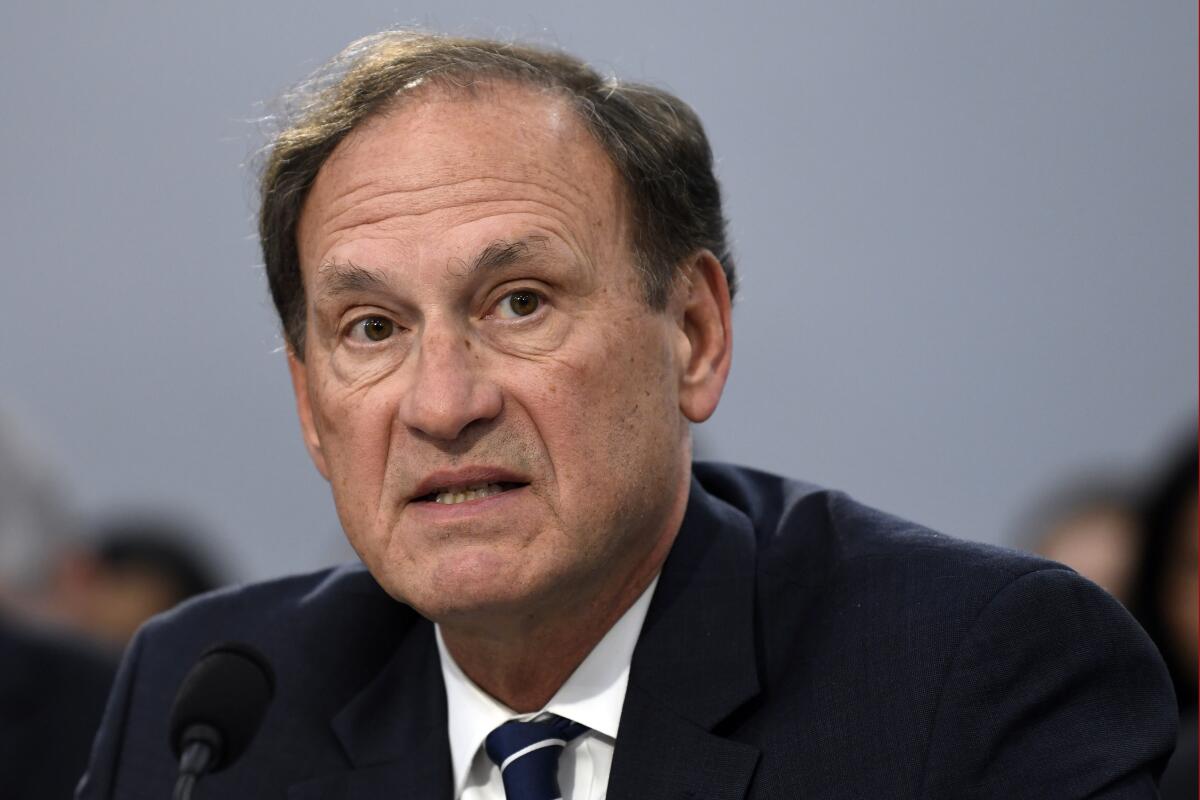Commentary: My nonreligious children shouldn’t worry Justice Alito

Plenty of people have concerns about raising children without religion. I know, because I have three kids (two 10-year-olds and a 6-year-old), and they’re about as familiar with the Bible as they are with the Quran, the Bhagavad Gita or Dianetics.
One of those concerned adults is Samuel A. Alito Jr., the Supreme Court justice who wrote the opinion overturning Roe vs. Wade. In a recent talk he gave on religious freedom — noted mostly for his snide remarks against foreign critics of his abortion decision — Alito said this:
“I am reminded of an experience I had a number of years ago in a museum in Berlin. One of the exhibits was a rustic wooden cross. A young, an affluent woman — a well-dressed woman — and a young boy were looking at this exhibit, and the young boy turns to the woman, presumably his mother, and said, ‘Who is that man?’
“That memory has stuck in my mind as a harbinger of what may lie ahead for our culture. And the problem that looms is not just indifference to religion — it’s not just ignorance about religion — there’s also a growing hostility to religion.”
Alito gave no indication he heard the adult’s answer, and judging by the fact that he used the anecdote to set up a lecture on threats to religious liberty, I doubt he’s interested in it. To him and those upholding Christian primacy in this country (which is waning, quickly), a child asking that question at all unsettles them.
It doesn’t have to. If Alito had bothered to listen to the adult’s response, he might have learned something — perhaps how secular parents navigate societies still dominated by religious traditions, how we talk about other people’s cherished beliefs, or how we try to impart empathy and compassion to children, who naturally seem inclined to both.
Alito and other Christian parents may have answers supplied by their faith traditions to complicated questions such as, “Who is that man on the cross?” or “What happens when we die?” Nonreligious parents don’t, which can be worrying, but at the same time liberating.
That man on the cross, of course, is Jesus, but who Jesus was and what he means to different people, from a non-Christian perspective, has answers that raise only more questions. As for what happens when we die — well, that’s a question I’ve accepted as complicated, and we’re working through that.
To get an expert’s take on how my fellow nonreligious parents approach these questions, I talked to Phil Zuckerman, a professor of sociology and secular studies at Pitzer College who has written about the increasingly irreligious typical American family. Zuckerman has spent much of his career putting minds at ease over secular childrearing, so he sounded almost exasperated.
The data overwhelmingly show an inverse relationship between a society’s religiosity and its measurable well-being, he said, and places like Japan (with no history of Christianity) and Scandinavia (historically Christian but predominantly nonreligious today) take better care of their elderly and have lower murder and poverty rates than the United States.
If people like Alito truly were concerned about America growing less moral as we careen on our secularizing trajectory, those facts ought to reassure them. And as for the question about the man on the cross that troubled Alito: How might a nonreligious parent answer that question? As a lapsed Lutheran, I can explain what most Christians believe about that man who lived and died roughly 2,000 years ago in present-day Palestine and Israel.
Without the goal of indoctrination, the aim becomes informing children and nurturing respect for people who have different beliefs. In my kids’ case, most of the family members they love practice some sort of faith; many are devout Christians. I teach them that just as they wouldn’t want to feel attacked for not having a religion, they should not attack their friends, grandparents, aunts and uncles for having one.
In other words, do unto others as you would have them do unto you. That’s the golden rule, which can be found in nearly every religious and ethical tradition.
So Justice Alito, you don’t have to worry about children growing up without a religion assigned by their parents. But I wish I could say that my children don’t have to worry about you and the Supreme Court diminishing our religious liberty — which includes their right to be free from your religion.
More to Read
A cure for the common opinion
Get thought-provoking perspectives with our weekly newsletter.
You may occasionally receive promotional content from the Los Angeles Times.











